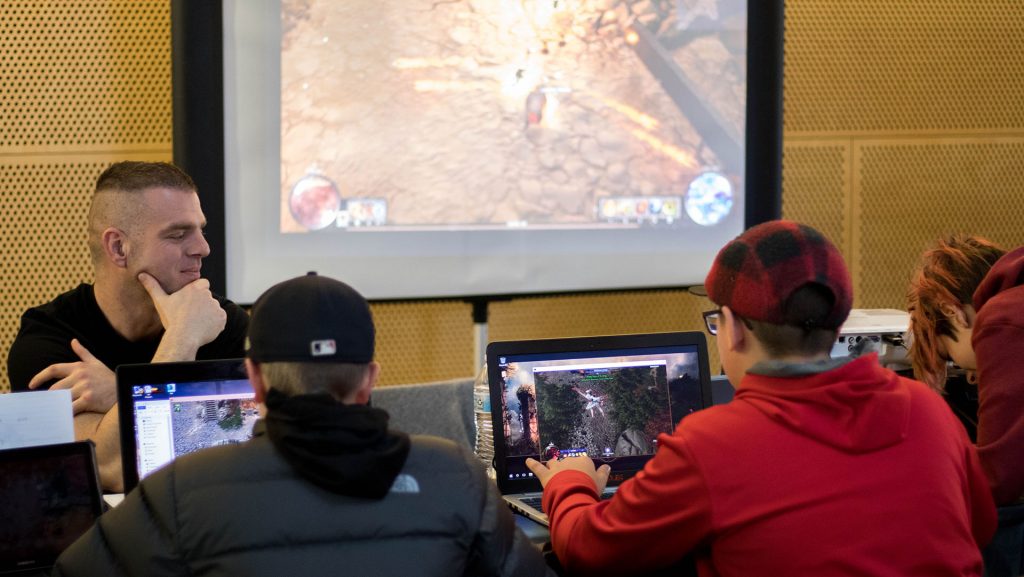Banerjee: Indie gaming needs your love
In the heart of the internet, small-time video game developers are doing amazing work that demands your attention (and maybe even some financial love).
Gamers play during the EPX Con at the Art Building West on April 14, 2018. EPX Con is a conference dedicated to animation and gaming.
November 7, 2018
On Oct. 31, Halloween, the sequel to the acclaimed 2015 role-playing game Undertale was released. The creator, Toby Fox, released a number of cryptic hints on Twitter leading up to the eventual drop of the first chapter of the sequel, Deltarune, which was received with open arms by fans across the world.
The original game was an impressive feat of small-time gaming. Fox, a video-game developer and composer, took approximately three years to create the cult hit, which went on to sell 1 million copies in the world. Its success is based on its intricately structured plot, design, and play. Fox composed the music, designed many of the sprites, and built the game himself. Funding the game through Kickstarter, he entirely bypassed standard gaming development and publishing, allowing Fox to put out a creation entirely of his own.
Indie development is a major, growing player in a number of different media. Indie films are often played at local art house theaters such as FilmScene; indie books and poetry are often housed in stores such as Prairie Lights, which offers a wide selection of works from independent or small publishers. But, for gaming, it is often incredibly difficult to find an audience for smaller-scale games. Overshadowed by massive corporate publishers such as Electronic Arts, Nintendo, and Activision and shackled to a more contained form of enjoyment, independent video games rarely get the treatment that they deserve.
Fox’s Undertale is just one example of truly exemplary work that is, by all definitions, an art form. Large-scale games can often be beautiful artistic creations as well, but the attention devoted to a small game is often unparalleled. Undertale, for one, has intricately devised plotting that is connected to the form in ways that are rarely seen in video games.
RELATED: Dungeons & Dragons, a world of improv, creativity, and solving problems.
Thankfully, the game did become a relatively large success, but in general, indie gaming struggles to breach commercial markets, making it difficult to fund the project. Independent studios often struggle to stay afloat. Kotaku estimated the cost for the average video-game publisher per person per month is roughly $10,000. The price of building your own video game is prohibitive; even promising indie studios fall, such as Telltale did early last month.
There are some platforms that are worth mentioning for their attention to promoting independent gaming. For example, Steam, a digital distribution company founded by the independent publisher Valve (known for the Half-Life series), has amassed a huge collection of independent games. It has become a vital part in supporting small gaming and allowing it to thrive in a larger market than ever. Without it, some of the most important independent games of recent memory wouldn’t have been able to be nearly so successful.
Another notable indie gaming example is the well-respected game the Stanley Parable. Beginning as a modification, or mod, for the Half-Life series, the game was distributed solely over Steam Greenlight initially. The game, a philosophy-driven interactive storytelling simulator, made waves in the indie-gaming community for its witty satirical writing that commented on the ideas of choice and decision-making in video games. It quickly became popular among critics and players alike.
Gaming is a living art form and has the ability to expand beyond its commercial boundaries if given the right attention. It often has the same complexity as other narrative media and often takes it in new and exciting directions. Even if it is not your choice of medium, gaming still offers players an exciting, complex, and interesting source of entertainment that deserves the recognition that other forms get for doing similar things.
RELATED: Point-counterpoint: Should production houses make reboot movies?






